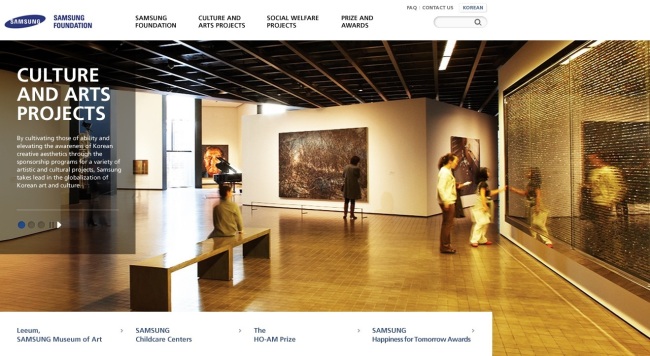Conglomerates abusing CSR firms to tighten ownership
By Korea HeraldPublished : June 30, 2016 - 09:29
[THE INVESTOR] South Korean conglomerates are on high alert following the proposal of a bill limiting the voting rights of their shares in affiliated public goods corporations.
This could be a major blow to the large industrial groups since many of them maintain their control over key affiliates via such corporations.
“These public interest corporations have not spent a dime on promoting public interest. Their sole purpose is to perpetuate the current ownership structure of the chaebol,” said Kim Woo-chan, head of the Economic Reform Research Institute.
This could be a major blow to the large industrial groups since many of them maintain their control over key affiliates via such corporations.
“These public interest corporations have not spent a dime on promoting public interest. Their sole purpose is to perpetuate the current ownership structure of the chaebol,” said Kim Woo-chan, head of the Economic Reform Research Institute.

He cited the think tank’s survey showing that between 2009 and 2013, none of the public interest corporations affiliated with the country’s top industrial groups actually spent money for public interest.
In fact, these so-called CSR (corporate social responsibility) firms are actually anti-beneficial for the public, according to Kim.
“In return for being classified as public interest firms, they get significant tax breaks. If these firms had actually paid these taxes, it could have been used for better purposes,” he said.
Kim also pointed out that because the founding families can control affiliates through their CSR operations, they are also dodging inheritance taxes.
"If the second and third generation of the owner families legally sought control, they would have to pay a staggering amount of inheritance taxes," he said.
According to a recent survey by the institute, 71 percent of the country’s large industrial groups controlled other affiliates through public interest corporations.
Samsung Group (chairman Lee Kun-hee) holds stakes in six different affiliates via three public interest firms under Samsung Foundation.
These firms together hold a 6.86 percent stake in Samsung Life. Samsung Life is a key player in Samsung’s corporate governance structure -- it holds a 7.75 percent stake in Samsung Electronics. The amount is the largest held by a single shareholder.
This means the voting rights exercised by Samsung Foundation are directly linked to Samsung’s ownership structure.
In fact, these so-called CSR (corporate social responsibility) firms are actually anti-beneficial for the public, according to Kim.
“In return for being classified as public interest firms, they get significant tax breaks. If these firms had actually paid these taxes, it could have been used for better purposes,” he said.
Kim also pointed out that because the founding families can control affiliates through their CSR operations, they are also dodging inheritance taxes.
"If the second and third generation of the owner families legally sought control, they would have to pay a staggering amount of inheritance taxes," he said.
According to a recent survey by the institute, 71 percent of the country’s large industrial groups controlled other affiliates through public interest corporations.
Samsung Group (chairman Lee Kun-hee) holds stakes in six different affiliates via three public interest firms under Samsung Foundation.
These firms together hold a 6.86 percent stake in Samsung Life. Samsung Life is a key player in Samsung’s corporate governance structure -- it holds a 7.75 percent stake in Samsung Electronics. The amount is the largest held by a single shareholder.
This means the voting rights exercised by Samsung Foundation are directly linked to Samsung’s ownership structure.

The situation is the same at Hyundai Motor Group, the nation’s No.2 industrial group. Through the Chung Mong-koo Foundation, the firm has a 4.46 percent stake in Hyundai Glovis and a 9 percent stake Hyundai Innocean.
LG (chairman Koo Bon-moo), Hanwha (chairman Kim Seung-youn), Hyundai Heavy, Hanjin, Doosan, LS and Hyundai Group also all hold stakes in key affiliates amounting to 1 percent or more via public interest firms.
Lotte Group’s Lotte Foundation of Arts, for instance, received stock investments from seven Lotte affiliates, while Lotte Foundation received such investment from six.
In total, out of 28 industrial groups in the country -- there are currently 65 classified as large industrial groups, but 27 are to be dropped when the Fair Trade Commission strengthens the criteria in September -- 40 affiliates run by 20 of the groups owned stakes through public interest subsidiaries.
Earlier this month, several opposition party lawmakers proposed a bill for limiting the voting rights that public interest firms may exercise on their affiliates. The bill is almost a carbon copy of another bill that was shot down by the previous ruling party-led National Assembly, but the situation may become different now that the opposition has more seats.
By Kim Ji-hyun (jemmie@heraldcorp.com)
-
Articles by Korea Herald



















![[Today’s K-pop] Treasure to publish magazine for debut anniversary](http://res.heraldm.com/phpwas/restmb_idxmake.php?idx=642&simg=/content/image/2024/07/26/20240726050551_0.jpg&u=)